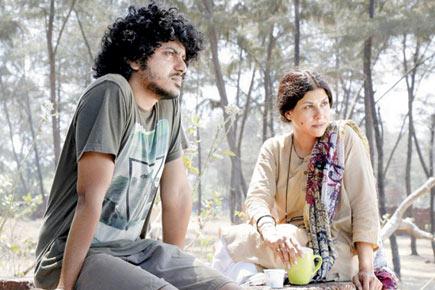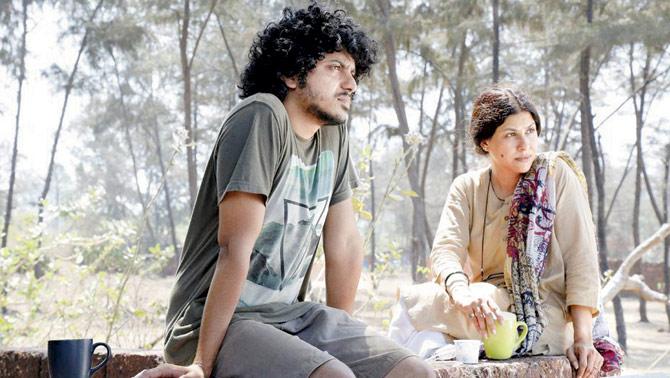I wonder how many Maharashtrians - let alone other Indians - have seen Kaasav (Turtle), which won the National Film Award for Best Feature Film of 2016


Alok Rajwade and Iravati Harshe in Kaasav, directed by Sumitra Bhave and Sunil Sukthankar, which won National Film Award for Best Feature Film of 2016.
 I wonder how many Maharashtrians - let alone other Indians - have seen Kaasav (Turtle), which won the National Film Award for Best Feature Film of 2016. Directed by Sumitra Bhave and Sunil Sukthankar, and produced by them and Dr Mohan Agashe, it is a sensitive, thoughtful social drama about mental illness. Of course, Marathi cinema has had a rich haul of eight National Film Awards this year, including the exceptional double whammy of Best Film for Bhave and Sukthankar, and Best Director for Rajesh Mapuskar for Ventilator. I congratulate all the winners of the National Awards. It is a different matter whether I agree with the award choices or not.
I wonder how many Maharashtrians - let alone other Indians - have seen Kaasav (Turtle), which won the National Film Award for Best Feature Film of 2016. Directed by Sumitra Bhave and Sunil Sukthankar, and produced by them and Dr Mohan Agashe, it is a sensitive, thoughtful social drama about mental illness. Of course, Marathi cinema has had a rich haul of eight National Film Awards this year, including the exceptional double whammy of Best Film for Bhave and Sukthankar, and Best Director for Rajesh Mapuskar for Ventilator. I congratulate all the winners of the National Awards. It is a different matter whether I agree with the award choices or not.
ADVERTISEMENT
In Kaasav, a liberal Maharashtrian woman, on the verge of a divorce and susceptible to panic attacks, shelters a stranger, a mentally disturbed young man, who has attempted suicide. The film employs a turtle analogy. The mother turtle lays her eggs on the beach and swims back to the sea, so the baby turtles, who hatch later, must make their way into the world alone. Just as conservationists help protect the baby turtles till they can toddle out to sea, here, too, Janaki (Irawati Harshe) offers a nest, from which Manav (Alok Rajwade) can find his way back again. While she initially seems to have a textbook goodness, and we learn at the end why she helps a complete stranger.
The film opens shortly before Manav, a runaway, has slit his wrists. Soon, he is rescued by Janaki, who takes him to her beautiful beach house in Devgad. She is on the mend herself, and so is empathetic to someone else who is mentally disturbed.
Her psychiatrist has also suggested that she do something selfless for others, to find a purpose in life, in order to heal, so she is involved in a turtle conservation project headed by Dattabhau (Dr Mohan Agashe, also co-producer). Slowly, thanks to Janaki's tender ministrations, and also the warmth of the fishing community - Yadu, Bablya and the lovely Parshu - Manav learns to take responsibility for himself and others again. In doing so, the film also redefines the modern Indian family.
Kaasav is made with a quiet dignity. Both Harshe and Rajwade are effective actors. Bhave and Sukthankar have made 14 features on social issues since 1985, including Devrai (on schizophrenia) and the brilliant Astu (So Be It), which won two National Awards.
Competing on the same turf as Bollywood biggies Dangal, Kapoor & Sons, Udta Punjab and Neerja, it is remarkable how modest-budgeted, Marathi indie cinema, spurning popular stars, dance and high drama, holds its own, and simply will not bend.
All the more surprising is that the National Award for Best Director went to Rajesh Mapuskar for Ventilator, who had earlier directed Ferrari ki Sawari. There could not be a greater contrast between Kaasav and Ventilator. The latter is a loud, fairly appalling, TV-style, laugh-a-thon, whose cast crams in a who's who, and suddenly delivers an emotional wallop in the end. When Gajanan Kamerkar is admitted to hospital and put on a ventilator, droves of rowdy relatives descend from the Konkan, but they are more worried about what happens to their Ganesh festivities if he pops it. It is left to dignified protagonist Ashutosh Gowariker to save the film; he spurs a father-son reconciliation. The film is produced by Priyanka Chopra and Madhu Chopra, and we hope the National Awards encourage Bollywood to nurture more talent in other languages.
If key Oscar-nominated films are released theatrically in India at Oscar time, the Directorate of Film Festivals should release a package of all the key National Award-winning films, right after the national film awards are announced, when the iron is hot. If Indians can't see the best of Indian cinema, what's the point?
Meenakshi Shedde is South Asia Consultant to the Berlin Film Festival, award-winning critic, curator to festivals worldwide and journalist. Reach her at meenakshishedde@gmail.com.
 Subscribe today by clicking the link and stay updated with the latest news!" Click here!
Subscribe today by clicking the link and stay updated with the latest news!" Click here!







